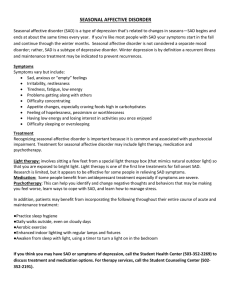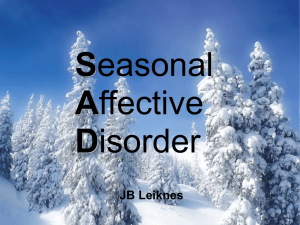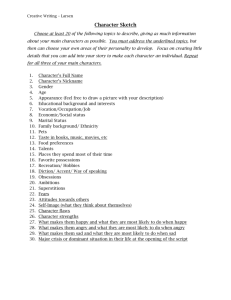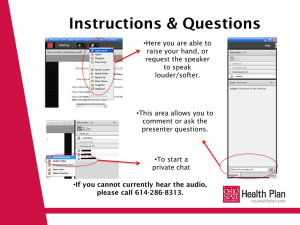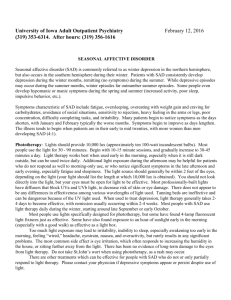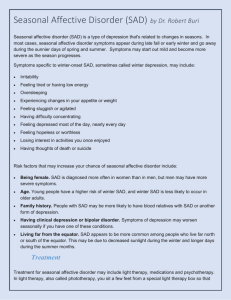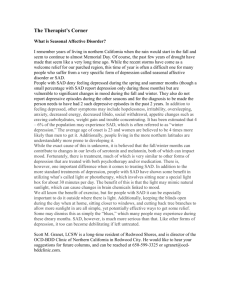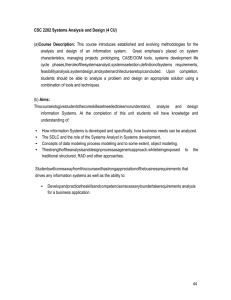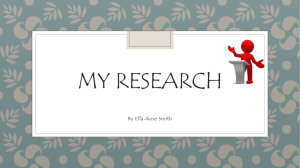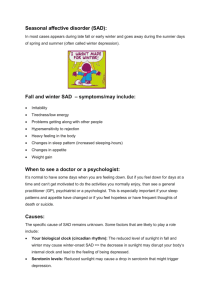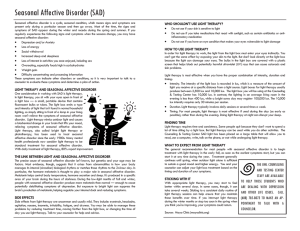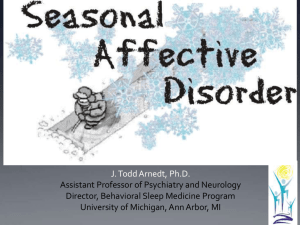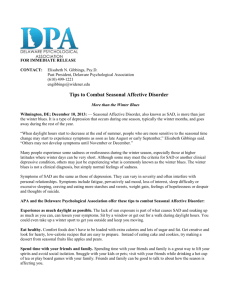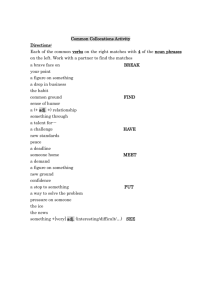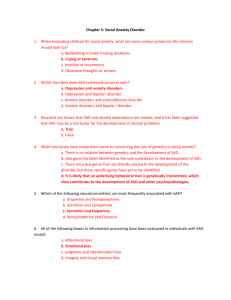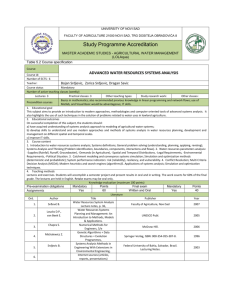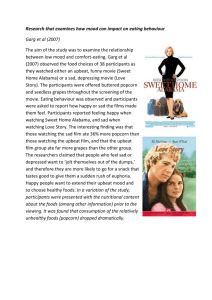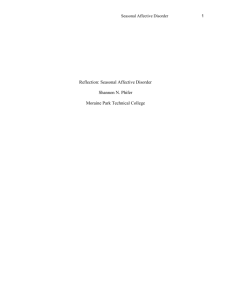Seasonal Affective Disorder
advertisement
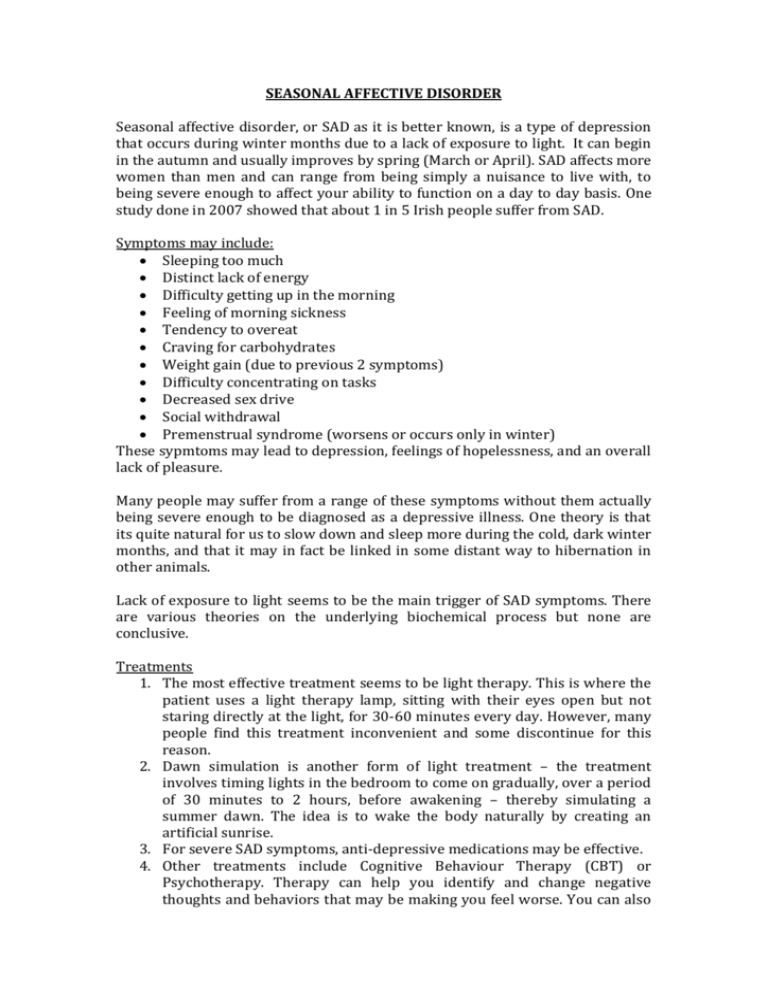
SEASONAL AFFECTIVE DISORDER Seasonal affective disorder, or SAD as it is better known, is a type of depression that occurs during winter months due to a lack of exposure to light. It can begin in the autumn and usually improves by spring (March or April). SAD affects more women than men and can range from being simply a nuisance to live with, to being severe enough to affect your ability to function on a day to day basis. One study done in 2007 showed that about 1 in 5 Irish people suffer from SAD. Symptoms may include: Sleeping too much Distinct lack of energy Difficulty getting up in the morning Feeling of morning sickness Tendency to overeat Craving for carbohydrates Weight gain (due to previous 2 symptoms) Difficulty concentrating on tasks Decreased sex drive Social withdrawal Premenstrual syndrome (worsens or occurs only in winter) These sypmtoms may lead to depression, feelings of hopelessness, and an overall lack of pleasure. Many people may suffer from a range of these symptoms without them actually being severe enough to be diagnosed as a depressive illness. One theory is that its quite natural for us to slow down and sleep more during the cold, dark winter months, and that it may in fact be linked in some distant way to hibernation in other animals. Lack of exposure to light seems to be the main trigger of SAD symptoms. There are various theories on the underlying biochemical process but none are conclusive. Treatments 1. The most effective treatment seems to be light therapy. This is where the patient uses a light therapy lamp, sitting with their eyes open but not staring directly at the light, for 30-60 minutes every day. However, many people find this treatment inconvenient and some discontinue for this reason. 2. Dawn simulation is another form of light treatment – the treatment involves timing lights in the bedroom to come on gradually, over a period of 30 minutes to 2 hours, before awakening – thereby simulating a summer dawn. The idea is to wake the body naturally by creating an artificial sunrise. 3. For severe SAD symptoms, anti-depressive medications may be effective. 4. Other treatments include Cognitive Behaviour Therapy (CBT) or Psychotherapy. Therapy can help you identify and change negative thoughts and behaviors that may be making you feel worse. You can also learn healthy ways to cope with seasonal affective disorder and manage stress. 5. Vitamin D and Omega 3 fatty acids (found in fish) may also help. Recent research has indicated that Irish people suffer from a lack of Vitamin D because of the shortage of sunlight here. TIPS Try to spend some time outside everyday. Even on cold or cloudy days, being outside can help, particularly if you spend time outside within two hours of getting up. Keep blinds open, try to sit near the window at work – alter your environment to maximize your exposure to daylight. Keep up regular exercise. Exercise is one of the most effective ways to conquer depression or anxiety. Physical exercise helps to relieve stress and also helps to improve your mood and how you feel about yourself. Before you run out to purchase a light therapy box or consider light therapy, talk to your doctor or mental health provider to make sure it's a good idea and to make sure you're getting a high-quality light therapy box. Include foods rich in Omega 3 in your diet (cold-water fish such as salmon, mackerel and herring: flaxseed, flax oil, walnuts) Taking up yoga or meditation, going for a regular massage, or acupuncture sessions – may all play their part in helping you to relax, feel better and help you cope with any SAD symptoms. NB: It's normal to have some days when you feel down. But if you feel down for days at a time and you can't seem to get motivated to do activities you normally enjoy, see your doctor. This is particularly important if you notice that your sleep patterns and appetite have changed or if you feel hopeless, think about suicide, or find yourself turning to alcohol for comfort or relaxation. NIAMH HANNAN Registered Counselling Psychologist Private Practice in Donnybrook, Dublin 4; see www.mindworks.ie
